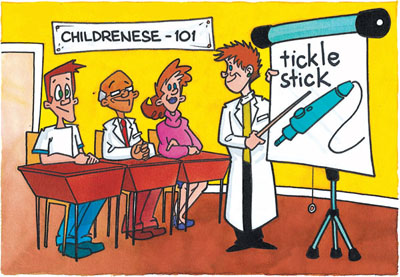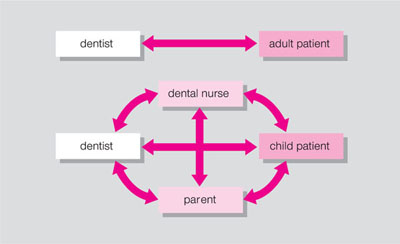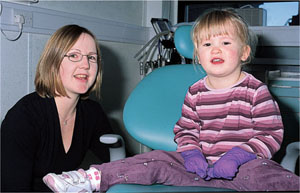Chapter 3
Child Taming II:
The Dental Team
Aim
This chapter aims to demonstrate how all members of the dental team can work together to manage children.
Outcome
Every individual team member should be able to participate actively in the delivery of dental care to each child who attends the practice, in a way that is both complementary to and supportive of his or her colleagues (Fig 3-1).

Fig 3-1 Team training.
Introduction
Each member of the dental team has a part to play in ensuring that a visit to the dentist is a pleasant experience. This means that dental surgeons have to decide how they want their practice to operate and each member of the team must understand what their role is and why it is important (Fig 3-2). Lines of communication with children can become very confusing unless ground rules are drawn from the outset.

Fig 3-2 Lines of communication between adult patient and dentist is usually two-way. With children, communication lines can be more confusing.
Dental Team Roles
The Dental Receptionist
The receptionist has a key role since she or he is the first member of the dental team that the child meets (Fig 3-3). A professional, caring attitude on the telephone and when the parent arrives with the child helps to reduce parental anxiety and thus the anxiety of the child. The easiest way to do this is to SMILE (and as a smile can be heard in your voice when you speak, this works over the telephone too).

Fig 3-3 The face that greets.
Sending a Pre-appointment Letter (see Appendix 1) prior to the first appointment can familiarise both child and parent with the practice and tells them what to expect during the first visit. The receptionist can confirm the contents of the letter with children who are coming to the practice for the first time as this is reassuring and helps establish their trust. Having appropriate toys and books can assist children by giving them a normal activity while they are waiting for their appointment and will help to take their mind off the forthcoming visit (Fig 3-4).

Fig 3-4 Get down to the child’s level. Note the dental gloves!
The child should be the centre of attention, so ensure your team uses the child’s name to welcome them individually as well as addressing the accompanying adult. The receptionist must also assist the dentist by arranging suitable appointment times for anxious children since they will need a series of appointments at short intervals apart to allow the dentist to build on the progress of each visit. Each clinician needs to dete/>
Stay updated, free dental videos. Join our Telegram channel

VIDEdental - Online dental courses


